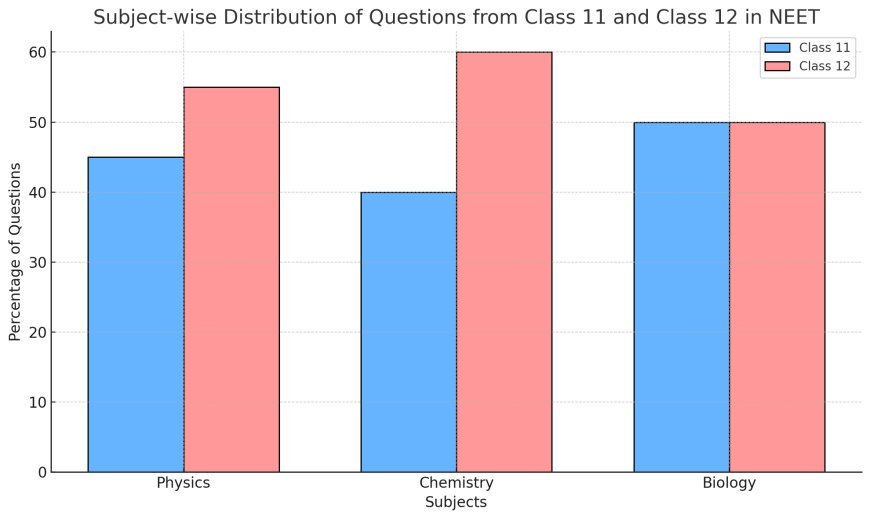Weightage of Questions in NEET from Class 11 and Class 12 Syllabus

Weightage of Questions in NEET from Class 11 and Class 12 Syllabus
The NEET exam covers topics from both Class 11 and Class 12 syllabi, following the NCERT curriculum. The distribution of questions is typically balanced between these two classes, ensuring that students are well-versed in concepts taught over both years. Here is a detailed breakdown of the approximate weightage of questions from the Class 11 and Class 12 syllabi in Physics, Chemistry, and Biology:
Physics:
In Physics, both the Class 11 and Class 12 syllabi contribute equally to the overall question set, with some key topics carrying more weight.
Class 11 Physics Topics:
- Mechanics: This is a major portion of the Class 11 syllabus and contributes significantly to the NEET exam. Topics like Laws of Motion, Work, Energy, and Power, and Rotational Motion are often tested.
- Properties of Matter: Concepts related to fluid mechanics, surface tension, and elasticity.
- Thermodynamics: Important principles of heat, work, and energy.
- Gravitation: Questions related to Kepler’s laws, escape velocity, and satellites.
Class 11 Weightage in Physics:
- Around 45% of the Physics questions in NEET come from the Class 11 syllabus.
Class 12 Physics Topics:
- Electrostatics and Current Electricity: This is a heavily tested area, with frequent questions on Coulomb’s law, electric fields, potential, capacitance, and circuits.
- Electromagnetic Induction: Questions on Faraday’s law, AC circuits, and transformers.
- Optics: Significant weightage is given to ray optics, lenses, and wave optics.
- Modern Physics: Key topics include atomic structure, photoelectric effect, Bohr’s model, and nuclear physics.
Class 12 Weightage in Physics:
- Around 55% of the Physics questions are from the Class 12 syllabus.
Chemistry:
Chemistry in NEET is divided into Physical Chemistry, Inorganic Chemistry, and Organic Chemistry, with a mix of questions from both Class 11 and Class 12 topics.
Class 11 Chemistry Topics:
- Basic Concepts of Chemistry: Questions on the mole concept, stoichiometry, and atomic structure are frequently asked.
- States of Matter: Important for questions on gases, liquids, and intermolecular forces.
- Thermodynamics: Topics related to enthalpy, entropy, and Gibbs free energy.
- Chemical Bonding: Concepts like hybridization, molecular orbital theory, and VSEPR theory are key.
- Equilibrium: Equilibrium in chemical reactions and ionic equilibria are important topics.
- Environmental Chemistry: Although minor, questions on environmental issues may come from this section.
Class 11 Weightage in Chemistry:
- Around 40-45% of the Chemistry questions come from the Class 11 syllabus.
Class 12 Chemistry Topics:
- Electrochemistry: Often tested with questions on Nernst equation, conductance, and electrolysis.
- Chemical Kinetics: Focuses on rate laws and reaction order.
- d- and f-Block Elements: Questions related to transition metals, their properties, and complex formation.
- Coordination Compounds: Ligands, coordination number, and bonding theories.
- Organic Chemistry: Class 12 sees significant weightage for organic chemistry topics like hydrocarbons, alcohols, aldehydes, amines, and carboxylic acids.
- Biomolecules and Polymers: Basic questions on carbohydrates, proteins, enzymes, and polymers are asked.
Class 12 Weightage in Chemistry:
- Around 55-60% of the Chemistry questions are from the Class 12 syllabus, with a strong emphasis on Organic Chemistry.
Biology:
As Biology constitutes 50% of the total NEET paper, it plays a vital role in determining the final score. Biology questions are divided equally between Botany and Zoology, and both Class 11 and Class 12 syllabi are covered thoroughly.
Class 11 Biology Topics:
- Diversity in the Living World: Topics on classification, plant and animal kingdom, and taxonomy.
- Cell Structure and Function: Questions on cell organelles, cell division, and biomolecules.
- Plant Physiology: Includes topics like photosynthesis, respiration, and transport in plants.
- Human Physiology: A major section, covering the digestive, circulatory, respiratory, excretory, nervous, and endocrine systems.
Class 11 Weightage in Biology:
- Around 45-50% of the Biology questions in NEET come from the Class 11 syllabus.
Class 12 Biology Topics:
- Genetics and Evolution: A key section, with questions on Mendelian inheritance, DNA replication, and theories of evolution.
- Biotechnology: Includes genetic engineering, DNA fingerprinting, and biotechnological applications.
- Reproduction: Topics include human reproduction, plant reproduction, and fertilization.
- Ecology and Environment: Focus on ecosystems, environmental issues, and biodiversity conservation.
- Human Health and Disease: Covers immunology, vaccines, AIDS, cancer, and common diseases.
Class 12 Weightage in Biology:
- Around 50-55% of the Biology questions come from the Class 12 syllabus, with particular emphasis on Genetics and Human Physiology.
Overall Weightage Distribution:
- Class 11 Syllabus:
- Physics: ~45%
- Chemistry: ~40-45%
- Biology: ~45-50%
- Class 12 Syllabus:
- Physics: ~55%
- Chemistry: ~55-60%
- Biology: ~50-55%
Conclusion:
While the NEET exam draws questions fairly evenly from both Class 11 and Class 12 syllabi, certain topics in Class 12 carry more weight, particularly in Chemistry and Biology. Successful candidates need a strong grasp of concepts from both years, as the balance between the two is crucial to scoring well in the exam.


 Achievers Team
Achievers Team 





